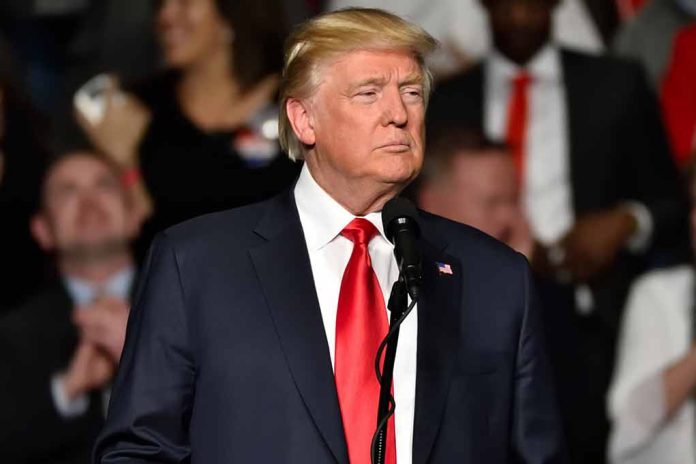
President-elect Trump’s plan to eliminate the $7,500 federal electric vehicle tax credit could reshape the American automotive landscape, with unexpected support from Tesla’s Elon Musk.
At a Glance
- Trump’s transition team considers eliminating the $7,500 EV tax credit as part of tax reform
- Tesla CEO Elon Musk supports ending subsidies, suggesting minimal impact on his company
- Ford, GM, and Rivian stock prices dropped following the announcement
- Energy Secretary nominee Chris Wright’s appointment aligns with shift away from EV incentives
- Congressional approval required for implementation
Trump’s Bold Move to Reshape EV Market
In a significant policy shift, President-elect Donald Trump’s transition team is considering the elimination of the $7,500 federal electric vehicle tax credit. This credit, a cornerstone of President Biden’s Inflation Reduction Act, has been instrumental in making electric vehicles more affordable for American consumers. The proposed change is part of a broader tax reform package that could extend the Tax Cuts and Jobs Act from Trump’s first term.
The potential removal of this tax credit has sent shockwaves through the automotive industry, with stock prices of major EV manufacturers like Ford, General Motors, and Rivian taking a hit. However, not all industry players are opposed to this move. Tesla, led by Elon Musk, has reportedly expressed support for ending the subsidy.
Exclusive: President-elect Donald Trump's transition team is planning to kill the $7,500 consumer tax credit for electric-vehicle purchases as part of broader tax-reform legislation, two sources with direct knowledge of the matter told Reutershttps://t.co/lxWXtGFiVD
— Reuters (@Reuters) November 14, 2024
Musk’s Surprising Stance and Industry Impact
Elon Musk’s support for ending EV subsidies aligns with his previous statements suggesting that such a move would have minimal impact on Tesla while potentially devastating its competitors. This position is particularly noteworthy given Tesla’s recent exhaustion of its credit allocation under previous programs.
“Tesla representatives have expressed support for ending the subsidy to Trump’s transition committee.” – Reuters report
The removal of the tax credit could significantly impact other manufacturers who have heavily invested in EV technology. Detroit automakers, in particular, may face substantial challenges in their manufacturing strategies. This shift could slow the transition towards electric vehicles, especially in regions traditionally dominated by the American auto industry.
Energy Policy Shift and Industry Response
President-elect Trump’s nomination of Chris Wright, founder and CEO of Liberty Energy, as Energy Secretary further signals a broader shift in energy policy. This appointment, coupled with the potential elimination of the EV tax credit, aligns with Trump’s campaign promises to target Biden’s clean energy initiatives.
“Losing $70,000 on an EV is not a winning business model and U.S. automakers know that” – Tim Stewart
The U.S. Oil & Gas Association has voiced support for removing the EV credit, suggesting it could allow automakers to return to traditional production lines. Tim Stewart of the association argues that this shift could be a relief for CEOs struggling with the current EV market dynamics.
Trump's transition team aims to kill Biden EV tax credit: Reuters https://t.co/6JflRlyGd5
— Michael Wayland (@MikeWayland) November 14, 2024
Concerns Over U.S. Competitiveness
Critics of the proposed change, including Energy Secretary Jennifer Granholm, warn that eliminating the tax credit could harm U.S. competitiveness in the global EV market. Industry experts caution that this move might undermine the significant investments already made in EV manufacturing within the United States.
“The auto industry is investing billions of dollars in EV battery and EV manufacturing in the United States. Eliminating the tax credit will hurt the U.S. auto industry and make American manufacturers less globally competitive” – Ingrid Malmgren
Market analysts predict that financially strong companies like Tesla could benefit from this policy change, while smaller EV manufacturers might struggle to compete without the incentive. The potential repeal of the EV tax credit would require congressional approval, setting the stage for what is expected to be a contentious legislative debate in the coming months.
Sources:
- Is the EV Tax Credit Going Away? What You Need to Know
- Trump’s cut to Biden’s EV tax credit, backed by Musk, may impact auto industry, experts say
- Trump’s cut to Biden’s EV tax credit, backed by Musk, may impact auto industry, experts say






